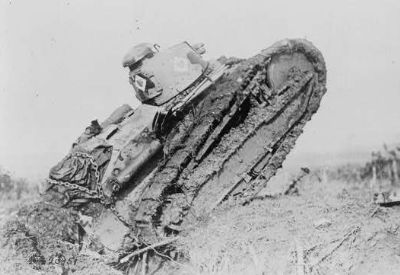
Near Saint Michel, France, during World War I, a tank ploughs through a trench and starts toward the German line (Library of Congress).
 Near Saint Michel, France, during World War I, a tank ploughs through a trench and starts toward the German line (Library of Congress). |
World War I itself or the terms of its later agreements cast long shadows that profoundly affected the decades to follow. The Irish Rebellion of 1916, the Bolshevik Revolution of 1917, bitterness and misery that helped lead to subsequent Nazism, rearmament, aggression, and genocide by the Germans, the rise of Communism, the breakup of vast regions of the Middle East into arbitrary "nations" with little social or political cohesion, early isolationism in America, and a series of arms races all had their origins in the war or its aftermath. Many of these formed the initial bases of enmity that persist today. Yet there were as well terrific advances in medicine and manufacturing, technological developments, phenomenal innovation in aircraft and shipping industries, not to mention a continued rise to great power and influence for the United States of America. Millions of European immigrants fleeing the war and its legacy of hard times made their way to the U.S. during and after World War I and helped to build this nation into what it has become. In other ways too The Great War was salutary, bringing together folks from diverse cultures and races. The upheavals engendered by The Great War led to pleasant as well as quite unfortunate later adjustments. In some ways the "Roaring Twenties" were only possible due to the conflict-focused years that preceded them. Yet vast numbers of people would die due to disruptions, displacements, and civil war in post-war Russia. That time of extreme hostility was seen as in many ways a transitional conflict. And before, folks were relatively idealistic. Afterward, not so much.
Many more World War I related commemorations will be opening or special events occurring as the calendar takes us to exactly 100 years following one or another signal occurrences from that sphere spanning fight.
One can as well check out photos or other lore from The Great War through various exhibits and museums, such as the Harry Ransom Center at the University of Texas at Austin, PBS television, or DVD documentaries about the First World War. I urge you not to let this opportunity pass to learn more about a key aspect of our times.